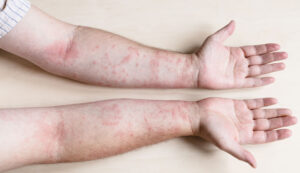Curing skin diseases naturally with health supplements involves supporting the body’s healing process through diet, lifestyle, and the right natural products. Many skin conditions, such as eczema, acne, psoriasis, and dermatitis, are influenced by inflammation, gut health, and nutrient deficiencies. Supplements like omega-3 fatty acids, zinc, and probiotics can reduce inflammation and promote healthier skin by balancing the body’s internal environment.
Vitamins and minerals play an important role in skin care. Vitamin C is known for its antioxidant properties, which protect the skin from free radical damage and promote collagen production. Vitamin E helps to moisturize the skin and enhance its healing, while biotin and zinc contribute to strong, clear skin. Supplements rich in these nutrients can significantly aid in reducing skin disease symptoms and improving overall skin texture and resilience.
In addition to taking supplements, adopting a holistic approach that includes staying hydrated, managing stress, and eating a balanced diet rich in antioxidants and healthy fats is important. Natural remedies like aloe vera, tea tree oil, and turmeric, combined with these supplements, can help alleviate skin irritation and improve skin health.
What Are Some Types Of Rare Skin Diseases?
Rare skin diseases encompass a wide range of conditions that are not commonly encountered. Many of these conditions can be challenging to diagnose and treat due to their uncommon occurrence. Here are some types of rare skin diseases:

1. Granuloma Annulare
Granuloma Annulare is a chronic skin condition characterized by ring-shaped lesions that typically appear on the hands, feet, elbows, or knees. Although it’s usually not painful, it may cause itching or discomfort. The exact cause of Granuloma Annulare is unknown, but it may be triggered by minor skin injuries, certain medications, or other underlying conditions like diabetes. When searching for the Best Treatment for Granuloma Annulare, treatment options may include corticosteroid creams, light therapy, or even oral medications for more severe cases. Some people may also benefit from natural remedies or lifestyle changes to help manage symptoms.
2. Harlequin Ichthyosis
This is a severe genetic disorder that affects newborns. Babies are born with thick, scaly skin that resembles armor plates, which can crack and cause significant discomfort. It is caused by a mutation in the ABCA12 gene, which affects the skin’s ability to regenerate normally.
3. Epidermolysis Bullosa (EB)
EB is a group of rare genetic conditions that cause the skin to become extremely fragile, leading to blistering and erosion from minor friction or trauma. Blisters can form anywhere on the body, including internal organs in severe cases.
4. Pemphigus Vulgaris
This is an autoimmune condition where the immune system mistakenly attacks healthy cells in the skin, leading to painful blisters and sores. These blisters can rupture easily, causing open wounds.
5. Morphea
Morphea is a rare skin condition characterized by patches of hard, discolored skin. It is a form of localized scleroderma and often affects the skin, though it may also involve deeper tissues like muscles and bones in more severe cases.
What causes skin diseases?
Skin diseases can be caused by a variety of factors, ranging from external irritants to internal health conditions. One common cause is infections, which may be bacterial, viral, fungal, or parasitic in nature. For instance, conditions like acne are caused by bacteria, while ringworm is a fungal infection. Environmental factors such as allergens, irritants, excessive sun exposure, and pollution can also cause skin diseases. Sunburns, eczema, and contact dermatitis are examples of skin conditions triggered by environmental exposure.

Additionally, genetic and autoimmune factors play a significant role in many skin disorders. Conditions like psoriasis, vitiligo, and eczema can have a hereditary component, meaning they can run in families. Autoimmune diseases, where the immune system mistakenly attacks healthy skin cells, can lead to chronic skin conditions like lupus or scleroderma. Hormonal imbalances, poor nutrition, and lifestyle factors such as stress or a lack of hygiene may also contribute to the causes of skin issues.
What Are The Best Supplements For Healthy Skin?
Maintaining healthy skin is a vital part of overall wellness, and while a balanced diet is fundamental, supplements can provide additional support for skin health. Here are some of the Best Supplements For Healthy Skin:
1. Vitamin C
Vitamin C is a powerful antioxidant that helps in the synthesis of collagen, a protein essential for skin elasticity and firmness. It can also help brighten the skin, reduce dark spots, and protect against sun damage. Consider taking 500 to 1,000 mg daily.
2. Vitamin E
Vitamin E is another potent antioxidant that helps protect skin cells from oxidative stress. It supports skin healing and can help reduce the appearance of scars and blemishes. A daily dose of 15 mg is generally recommended.
3. Omega-3 Fatty Acids
Found in fish oil and flaxseed oil, omega-3 fatty acids help maintain the skin’s lipid barrier, which keeps it hydrated and reduces inflammation. Aim for at least 1,000 mg of combined EPA and DHA daily for optimal skin health.
4. Collagen Peptides
Collagen supplements, often in powder form, can help improve skin elasticity, hydration, and overall texture. Studies suggest that taking 2.5 to 10 grams of collagen peptides daily can yield noticeable benefits.
5. Zinc
Zinc is crucial for skin repair and regeneration. It helps reduce inflammation and can improve conditions like acne. The recommended daily intake for adults is about 11 mg for men and 8 mg for women.
6. Biotin
Biotin, a B-vitamin, is often linked to hair and nail health, but it also supports skin health by maintaining its moisture and improving its overall appearance. A daily dosage of 30 to 100 mcg is typical.
7. Probiotics
Emerging research suggests that probiotics can have a positive effect on skin health by balancing gut microbiota, which may help reduce conditions like acne and eczema. Look for a high-quality probiotic with multiple strains.
8. Coenzyme Q10 (CoQ10)
CoQ10 is an antioxidant that helps protect the skin from oxidative stress and may reduce the appearance of fine lines and wrinkles. A daily dose of 30 mg is commonly recommended.
How Can I Prevent Skin Diseases By Using Herbal Supplements?
Preventing skin diseases with herbal supplements involves incorporating natural remedies known for their beneficial effects on skin health. Herbs such as aloe vera, turmeric, and chamomile possess anti-inflammatory and antimicrobial properties that can help reduce the risk of skin infections and irritations. Aloe vera is particularly effective for soothing sunburns and moisturizing the skin, while turmeric contains curcumin, a compound known for its ability to combat acne and other skin conditions. Additionally, chamomile can calm irritated skin and provide relief from conditions like eczema or dermatitis, making it a valuable addition to your skincare routine.

In addition to topical applications, certain herbal supplements can promote skin health from within. For example, flaxseed oil and evening primrose oil are rich in omega-3 and omega-6 fatty acids, which help maintain skin hydration and elasticity. Antioxidant-rich herbs such as green tea and grape seed extract can protect the skin from oxidative stress caused by environmental factors like pollution and UV radiation. By combining these herbal supplements with a balanced diet and proper hydration, you can enhance your skin’s resilience and reduce the likelihood of developing various skin diseases.
Conclusion
Natural remedies and health supplements can significantly aid in managing and potentially curing various skin diseases by providing essential nutrients that support skin health. Supplements like vitamins A, C, E, and omega-3 fatty acids can promote healing and reduce inflammation, while herbal remedies such as aloe vera and turmeric possess anti-inflammatory properties that enhance skin repair. Combining these supplements with a balanced diet, proper hydration, and a consistent skincare routine can lead to improved skin health. However, it’s important to consult with a healthcare professional for personalized advice, as individual responses to treatments can vary, and a holistic approach is key for long-term success.




